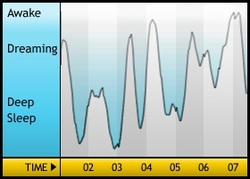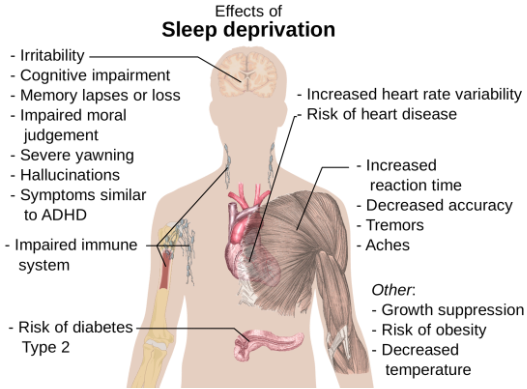THE NEED FOR SLEEP

We need to sleep. Everyone knows this instinctively. It is important to everyone and is critical for people in safety sensitive occupations....such as pilots.
It has been relatively recent that medical science has begun to study sleep in an in-depth fashion. This may be in part due to the fact that few adequate research tools were available to do this type of research. Most studies were of an observational nature or studied changes in blood chemistry. New tools are now available (such as neuro-imaging) and hold promise with respect to enhancing our knowledge in this area.
Numerous questions still exist. Why is sleep important? What function(s) does sleep serve? What ill effects will occur as a result of sleep deprivation? Why do some individuals tolerate sleep deprivation better than others? How do medications and what we eat and drink affect sleep architecture? And many more.
It has been relatively recent that medical science has begun to study sleep in an in-depth fashion. This may be in part due to the fact that few adequate research tools were available to do this type of research. Most studies were of an observational nature or studied changes in blood chemistry. New tools are now available (such as neuro-imaging) and hold promise with respect to enhancing our knowledge in this area.
Numerous questions still exist. Why is sleep important? What function(s) does sleep serve? What ill effects will occur as a result of sleep deprivation? Why do some individuals tolerate sleep deprivation better than others? How do medications and what we eat and drink affect sleep architecture? And many more.
WHY DO WE NEED TO SLEEP?

I suppose the place to start is with the basic question "Why do we need to sleep"? The following is taken from an article of the same title found in the MedSleep newsletter, "Sleep Matters" (Volume 4.1)
The multiple Hypotheses proposed to explain the function of sleep reflect our incomplete understanding. It is likely that sleep evolved to fulfill some sort of primitive function and has taken on multiple functions over time. Animals are most vulnerable when they are asleep. Evolution moves to minimize vulnerability. This would argue that sleep remains an essential physiologic process across all species.
These hypotheses include:
GROWTH AND RESTORATION (bodily growth and development in children, and tissue repair and restoration in adults)
ONTOGENESIS (development of an organism from the earliest stage to maturity)
MEMORY PROCESSING (allows solidification of knowledge and memory)
WASTE CLEARANCE (clearance of metabolic waste products produced by neural activity of the awake brain).
For further reading and information about MedSleep click here
The multiple Hypotheses proposed to explain the function of sleep reflect our incomplete understanding. It is likely that sleep evolved to fulfill some sort of primitive function and has taken on multiple functions over time. Animals are most vulnerable when they are asleep. Evolution moves to minimize vulnerability. This would argue that sleep remains an essential physiologic process across all species.
These hypotheses include:
GROWTH AND RESTORATION (bodily growth and development in children, and tissue repair and restoration in adults)
ONTOGENESIS (development of an organism from the earliest stage to maturity)
MEMORY PROCESSING (allows solidification of knowledge and memory)
WASTE CLEARANCE (clearance of metabolic waste products produced by neural activity of the awake brain).
For further reading and information about MedSleep click here
NORMAL SLEEP

Normal sleep is divided into 2 main stages--NREM (non rapid eye movement) and REM (rapid eye movement) sleep. NREM sleep is further divided into 4 stages--stages 1 through 4, each being a progressively deeper state of sleep such that progressively stronger stimuli is needed to wake someone from each stage. The stages are defined based primarily on the appearance of the EEG (electroencephalogram) in each stage.
Normally, NREM sleep occurs first, progressing through stages 1 to 4, and REM sleep follows. This cycle repeats itself 4 or 5 times during an 8-hour sleep period. With each cycle, the amount of time spent in REM sleep increases from perhaps 10 minutes or so in the first cycle to 60 minutes or more in the last cycle.
Normally, NREM sleep occurs first, progressing through stages 1 to 4, and REM sleep follows. This cycle repeats itself 4 or 5 times during an 8-hour sleep period. With each cycle, the amount of time spent in REM sleep increases from perhaps 10 minutes or so in the first cycle to 60 minutes or more in the last cycle.
SLEEP PHYSIOLOGY
Sleep is a state of unconsciousness in which the brain is relatively more responsive to internal than external stimuli. It was once thought to be a passive state, but we now know (thanks to neuro-imaging technology) that it is a very active and vital state, absolutely necessary for the maintenance of health in every sense of the word.
EFFECTS OF SLEEP DEPRIVATION
 Häggström, Mikael. "Medical gallery of Mikael Häggström 2014". Wikiversity Journal of Medicine 1 (2).
Häggström, Mikael. "Medical gallery of Mikael Häggström 2014". Wikiversity Journal of Medicine 1 (2). This is an area of intense clinical research with numerous published studies. Sleep deprivation is not only detrimental to health, it can be fatal. Studies with rats have shown that total sleep deprivation resulted in death in a matter of weeks or months. The rats also lost weight despite eating more than the control group. They developed sores on their tails and paws indicating a failure of the immune system. (Sleep 1989 Feb:12(1):13-21). True, people are not rats. But numerous human studies have demonstrated a plethora of adverse effects associated with sleep deprivation in all areas: physical, mental and emotional.
In Part 2, I will discuss sleep apnea. In recent years this condition has received much attention in both the medical literature and the lay press....with good reason. It has been linked to all the adverse health conditions associated with sleep deprivation mentioned above. In addition, it has been implicated as the cause of numerous accidents...in the air, on the road, and in the workplace.
Sleep well.....Be well.
Armando
Sleep well.....Be well.
Armando
 RSS Feed
RSS Feed